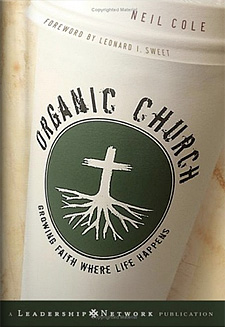It's Church Jim, but not as we know it.
Sorry, shameless Star Trek quote rip-off… Now I’m not a Trekky by any stretch of the imagination, but the quote came to mind as I reflected on Neil Cole’s most recent book, Organic Church.
I ploughed through the book over the Australia Day long weekend, mainly as the content compelled me to keep reading. In a nutshell Cole, who has previously been a “normal” church pastor as well as a denominational church planting leader, puts forward the view that, in this post-modern age, the most effective way of spreading the gospel is via what he calls ‘organic church planting movements’.
 The book starts with a parallel to the Matrix (which seems like a popular thing to do with Christian writers). Cole suggests the info that follows is a bit like ‘taking the red pill’ which, if you haven’t seen the movie, is something Neo (Keanu Reeves) does in order to be freed from the blissful ignorance of the matrix and exposed to the stunning truth of the real world. I don’t know that Cole’s revelations are on the same scale that the revelations about the Matrix were to Neo (that his whole existence was a complete ruse), but in many ways I felt like my eyes were opened to some profound possibilities.
The book starts with a parallel to the Matrix (which seems like a popular thing to do with Christian writers). Cole suggests the info that follows is a bit like ‘taking the red pill’ which, if you haven’t seen the movie, is something Neo (Keanu Reeves) does in order to be freed from the blissful ignorance of the matrix and exposed to the stunning truth of the real world. I don’t know that Cole’s revelations are on the same scale that the revelations about the Matrix were to Neo (that his whole existence was a complete ruse), but in many ways I felt like my eyes were opened to some profound possibilities.
Like many, Cole is not a fan of “Attractional” church, and his alternative very much focuses on taking the gospel to the people. One of the key starting points is frequenting places where people gather and then building relationships. The places he mentions are cafes, coffee shops, sporting venues, parks and playgrounds - wherever people congregate. For Cole, the local coffee shop was his venue of choice (to which I say, amen) and he recounts the story of developing a faith community out of the caffeine-addicted regulars, which then went on to start another faith community in the next coffee shop.
After six years of this process of ‘injecting’ the gospel into these normal, everyday places and passing it on from place to place, Cole claims that there are now over 600 functioning faith communities comprising over 10,000 people. Now you may not be impressed by numbers (I keep seeing comments suggesting success is not measured by converts), but however you see it, there now seems to be 10,0000 more people who know Jesus thanks to the Holy Spirit and Neil Cole’s approach than before.
I see both strengths and areas for caution in Cole’s discipleship approach.
One key strength is reproducibility. This is an area the “Attractional” church model really struggles with as it requires a lot of energy, money, and talent to run this type of church to a standard that people are used to in the regular world. Anyone who has started a new church plant will know this. The “Organic” approach, on the other hand, requires very little resource, and in fact funnels a large part of the most available resource " time " into relationship building.
Another strength is that those groups of people who would never even consider the Christian Church as a place to meet their spiritual yearnings are within reach. By going to them, tribes like Tradies, Goths, Emo’s, Atheists and hardcore metal fans can all fall into the relationship circles of Christians and therefore the gospel.
The main areas for caution are that of leadership development and maintaining sound doctrine. In reading the book you very much get the sense that new believers become leaders of these new faith communities pretty quickly, raising obvious questions around spiritual maturity and wisdom. I am in two minds about this. On the one hand, leadership of a church (regardless of size) in my tribe (Anglicans) is predicated on at least four years of full-time theological training. On the other hand, when Paul and Co were starting churches in the new testament they “appointed elders for them in every church, with prayer and fasting they committed them to the Lord” according to Acts 14:23 [ESV]. They didn’t send them off to bible college for four years before they were counted worthy to lead. If it was good enough for Paul, should it also be good enough for us?
On balance, if you could ensure sound doctrine underpinned each new faith community being developed, I reckon Cole’s approach has real merit.





















